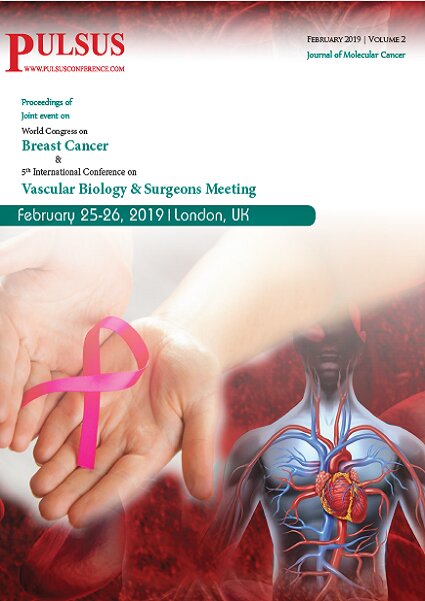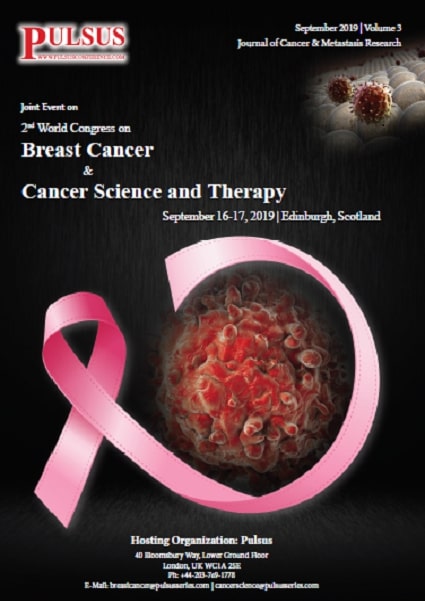Previous Speakers
Conference Information
Welcome Message
With the incredible accomplishment of Breast Cancer 2019, it's an amazing enjoyment and a respect to release up our warm welcome to the "4th World Congress on Breast Cancer and Women's Health ", set up for July 01-02, 2020 in Paris, France which circuits influence keynote introductions ,oral talks, and Poster presentation.
On this promising occasion, Organizing Committee invites the individuals from wherever all through the globe to share in this yearly chief gathering with the theme "An Insight Research for the better Women Healthcare". Breast Cancer 2020 in declare data and offer new musings among the specialists, industrialists and understudies from research zones of helpful organizations to the Women's, particularly in the finding and treatment of disarranges influencing the female conceptive organs and moreover to share their investigation experiences and appreciate instinctive talks and concentrated sessions at the event.
We will be happy to join experts from different countries and exchange their viewpoints, brace data base and adjust new thoughts of Breast Cancer and Women's Health.
We really welcome you to oblige us and your quintessence will completely build the estimation of the social occasion and especially appreciated..!
Regards
Organzing Committee
Breast Cancer & Womens Health Congress 2020
About Conference
Breast Cancer 2020 Congress invites all the participants from all over the world to attend "4th World Congress on Breast Cancer & Womens Health" going to be held in Paris, France during July 01-02, 2020. Breast Cancer Congress includes prompt keynote presentations, Oral talks, Poster presentations, Workshops, Symposiums and Exhibitions.
Breast Cancer Congress provides state-of-the-art information on the experimental biology, etiology, prevention, diagnosis, and therapy of breast cancer and premalignant breast disease, to an international audience of academic and private physicians and researchers.
Conference Opportunities
For Researchers and Faculty Members:
Speaker Presentations
Poster Display
Symposium hosting (4-5member team)
Workshop organizing
For Universities, Associations & Societies:
Association Partnering
Collaboration proposals
Academic Partnering
Group Participation
For Students and Research Scholars:
Poster Competition (Winner will get Best Poster Award)
Young Researcher Forum (YRF Award to the best presenter)
Student Attendee
Group registrations
For Business Delegates:
Speaker Presentations
Symposium hosting
Networking opportunities
For Product Manufacturers:
Exhibitor and Vendor booths
Sponsorships opportunities
Marketing and Networking with clients
Workshop organizing 2020
Target Audience
- Breast Cancer Specialists
- Oncologists
- Obstestrics & Gynaecology
- Women's Health care professionals
- Research faculty
- Academic Scientists
- Students
- Medical Colleges
- Business Entrepreneurs
- Industry professionals
- Directors/Managers/CEO
- Presidents& Vice Presidents
- Marketing, Advertising and Promotion Agency Executives
Sessions & Tracks
Track 1- Innovation in Breast Cancer diagnosis
The microscope in a needle Optical Elastography are the two new innovations in the field of breast cancer treatment. The Microscope in a needle technique uses medical imaging device and OCT (Optical Coherence Tomography) the innovation is in a developing stage and will be available in hospital in around five years. Optical Elastography can be said the advanced innovation in breast cancer where the fingertip device allows the surgeon to take high-resolution images to see how tissue has moved, and even the cavity of the breast with microscopic accuracy. These innovations would bring a drastic change in malignancy detection as well as treatment.
Related conferences-
International Conferences on Clinical Oncology and Molecular Diagnostics Dublin, Ireland | 3rd World Congress on Advanced Cancer Science & Therapy October 15-16, 2019 Osaka, Japan |25th Biennal Congress of the European Association for Cancer Research, Netherlands| 29th Euro-Global Summit on Cancer Therapy & Radiation Oncology Rome, Italy | Experts Meet on Cancer Therapy Melbourne, Australia | 4th Annual Conference on Preventive Oncology 2019 Atlanta, Georgia, USA.
Related Societies & Associations-
American Cancer Society | National Breast Cancer foundation | European society of Breast Cancer | Cancer society of Finland | American Breast Cancer foundation | Japanese Breast Cancer Society |American Society of Clinical Oncology
Track 2- Breast Cancer Symptoms-
The most recognized symptom of breast cancer is a lump or mass in the breast tissue. While many women go to the doctor after finding a lump, every woman should also be aware of other changes to the breast or nipple.
Although a lump in the breast is typically associated with breast cancer, much of the time such lumps aren’t cancer.
Even though the majority of breast lumps are caused by less severe conditions, new, painless lumps are still the most common symptom of breast cancer.
Early on, a woman may notice a change in her breast when she performs a monthly breast exam or minor abnormal pain that doesn’t seem to go away.
Related Conferences-
International Conference on Biomarkers and Cancer Targets 2019 Dubai, UAE | World Cancer Summit 2019 Bangkok, Thailand | 14th Global Biomarkers Summit 2019 Oslo, Norway | Euro Oncology Summit October 18-19, 2019, Amsterdam, Netherlands | 9th Euro Breast Cancer Summit October 18-19, 2019, Amsterdam, Netherlands | Annual Congress on Cancer and Stem Cell Research October 17-18, 2019 New York, USA | International Conference on Molecular Markers and Cancer Therapeutics October 8-9, 2019 Dubai, UAE.
Related Societies & Associations-
Irish Cancer Society | Canadian Cancer Society | Singapor Cancer Society | Tongan Breast Cancer Society | Korean Breast Cancer Society | Breast Cancer foundation | Foundation for Women’s Cancer
Track 3- Inflammatory Breast Cancer
Inflammatory breast cancer (IBC) is rare. It differs from other types of breast cancer in its symptoms, outlook, and treatment. Inflammatory breast cancer (IBC) has some symptoms of inflammation like swelling and redness. But infection or injury do not cause IBC or the symptoms. IBC symptoms are caused by cancer cells blocking lymph vessels in the skin.
Tenderness, redness, warmth, and itching are also common symptoms of a breast infection or inflammation, such as mastitis if you’re pregnant or breastfeeding. Because these problems are much more common than IBC, your doctor might at first suspect infection as a cause and treat you with antibiotics.
IBC grows and spreads quickly, so the cancer may have already spread to nearby lymph nodes by the time symptoms are noticed. This spread can cause swollen lymph nodes under your arm or above your collar bone. If the diagnosis is delayed, the cancer can spread to lymph nodes in your chest or to distant sites.
Related Conferences-
Cancer Genomics Conference: New Era for Cancer Prevention October 08-09, 2019 Dubai, UAE | International Conference on Cancer Diagnosis & Treatment August 2-3 2019 Oslo, Norway | 2nd International Conference on Cancer Biology, Therapeutics and Drug Delivery October 03-04, 2019 Los Angeles, USA| 12th World Congress on Biomarkers & Clinical Research October 03-04, 2019 Los Angeles, USA | 3rd World Conference on Breast and Cervical Cancer September 27-28, 2019 Abu Dhabi, UAE | 3rd Cancer Diagnostics & Treatment Conference November 29-December 01, 2019 Dublin, Ireland | International Conference on Oncogenesis and Oncologic Emergency Medicine September 17-18, 2019,California, USA.
Related Societies & Associations-
American Society of Breast Surgeon | American Society of Clinical Oncology | Turkish Society of Medical Oncology | Zambian Oncology Society | Swiss Cancer league | Belgium Foundation Against Cancer |Bolivian Society of Oncology
Track 4-Mastectomy
Mastectomy is the removal of the whole breast. There are five different types of mastectomy: "simple" or "total" mastectomy, modified radical mastectomy, radical mastectomy, partial mastectomy, and subcutaneous (nipple-sparing) mastectomy
Mastectomy is a way of treating breast cancer by removing the entire breast through surgery. It’s often done when a woman cannot be treated with breast-conserving surgery (lumpectomy), which spares most of the breast. It can also be done if a woman chooses mastectomy over breast-conserving surgery for personal reasons. Women at very high risk of getting a second cancer sometimes have a double mastectomy, the removal of both breasts.
Many women prefer skin-sparing mastectomy because it offers the advantage of less scar tissue and a reconstructed breast that seems more natural. But it may not be suitable for larger tumors or those that are close to the surface of the skin.
Related Conferences -
28th International Conference on Cancer Research and Anticancer Therapies September 17-18, 2019 San Diego, USA | 4th International Congress on Epigenetics & Chromatin September 03-05, 2019 London, UK | International Conference on Cancer Research and Diagnostics August 15-16, 2019 Singapore | 28th Euro Congress on Cancer Science & Therapy August 09-10, 2019 Madrid, Spain | 8th World Conference on Women’s Health and Breast Cancer August 09-10, 2019 Abu Dhabi, UAE | 15th Asia Pacific Oncologists Annual Meeting September 5-6, 2019 Tokyo, Japan.
Related Societies & Associations-
Bulgarian Cancer Association | Canadian Association of Nurses in Oncology | Canadian Association of Radiation Oncology | Canadian Cancer Society | Canadian Society for Surgical Oncology | Cancer Association of Namibia | Cancer Association of South Africa
Track 5- Breast Reconstruction
Breast reconstruction surgery is the creation of a new breast shape, or mound, using surgery. It may be done after removal of a whole breast (mastectomy) or part of the breast (breast-conserving surgery).
Implant breast reconstruction involves restoring the shape and volume of the breast using a breast implant. Breasts reconstructed in this way tend to be close to a natural breast shape, but are firmer and move less naturally than those using your own tissue. This can mean it’s more difficult to get a natural shape when one breast, rather than both, is being reconstructed.
The reconstructed breast will not droop with age and may look higher than the other breast, particularly as you get older. If you lose or gain weight, this will affect the natural breast but not the reconstructed breast, causing a difference in shape and size. At some point you may need more surgery to the reconstructed breast, or to the other breast, for a better match.
Related Conferences-
Cancer Stem Cells: Advances in Biology and Clinical Translation, October 13- 17, 2019, Hong Kong, China | 2019 Cancer Research & Therapy Conference, October 14- 16, 2019, Orlando, USA | 8th InterAmerican Oncology Conference, October 17- 18, 2019, Buenos Aires, Argentina | IV International Conference on Cancer Research & Drug Development, October 21- 23, 2019, Baltimore, USA | 51st Annual Congress of the International Society of Paediatric Oncology, October 23-26, 2019, Lyon, France | 12th International Congress on Myeloproliferative Neoplasms, October 24- 25, 2019, New York, USA | 17th Annual School of Breast Oncology, October 31- November 2, 2019, Atlanta, USA
Related Societies & Associations-
Cancer Association of Zimbabwe | Cancer Council Australia | Cancer Nurses Society of Australia | Cancer Research UK | Cancer Research Institute French Society of Radiation Oncology | German Cancer Society | German Society of Radiation Oncology
Track 6- Types of Breast Cancer
There are many types of breast cancer. The most common types are ductal carcinoma in situ, invasive ductal carcinoma, and invasive lobular carcinoma.
The type of breast cancer is determined by the specific cells in the breast that are affected. Most breast cancers are carcinomas. Carcinomas are tumors that start in the epithelial cells that line organs and tissues throughout the body.
Related Conferences-
International Conference on Biomarkers and Cancer Targets 2019 Dubai, UAE | World Cancer Summit 2019 Bangkok, Thailand | 14th Global Biomarkers Summit 2019 Oslo, Norway | Euro Oncology Summit October 18-19, 2019, Amsterdam, Netherlands | 9th Euro Breast Cancer Summit October 18-19, 2019, Amsterdam, Netherlands | Annual Congress on Cancer and Stem Cell Research October 17-18, 2019 New York, USA | International Conference on Molecular Markers and Cancer Therapeutics October 8-9, 2019 Dubai, UAE.
Related Societies & Associations-
Hellenic Cancer Society | Hungarian Society for Radiation Oncology | Indian Cancer Society | International Agency for Research on Cancer| League Against Cancer in Slovakia | Lebanese Cancer Society | Lebanese Society of Medical Oncology
Track 7- Hormones Therapies
Hormone therapy is a form of systemic therapy, meaning it reaches cancer cells almost anywhere in the body and not just in the breast. It's recommended for women with hormone receptor-positive (ER-positive and/or PR-positive) breast cancers, and it does not help women whose tumors are hormone receptor-negative (both ER- and PR-negative).
Related Conferences-
International Conferences on Clinical Oncology and Molecular Diagnostics Dublin, Ireland | 3rd World Congress on Advanced Cancer Science & Therapy October 15-16, 2019 Osaka, Japan |25th Biennal Congress of the European Association for Cancer Research, Netherlands| 29th Euro-Global Summit on Cancer Therapy & Radiation Oncology Rome, Italy | Experts Meet on Cancer Therapy Melbourne, Australia | 4th Annual Conference on Preventive Oncology 2019 Atlanta, Georgia, USA.
Related Societies & Associations-
Medical Oncology Group of Australia | Middle East Cancer Consortium | National Cancer Institute | National Cancer Council | Society for the Fight Against Cancer | Society of Surgical Oncology | Spanish Association Against Cancer
Track 8- Breast Biopsies
A breast biopsy is a test that removes tissue or sometimes fluid from the suspicious area. The removed cells are examined under a microscope and further tested to check for the presence of breast cancer. A biopsy is the only diagnostic procedure that can definitely determine if the suspicious area is cancerous.
In most cases, a fine needle aspiration is chosen when the lump is likely to be filled with fluid. If the lump is easily accessible or if the doctor suspects that it may be a fluid-filled cystic lump, the doctor may choose to conduct a fine-needle aspiration (FNA). During this procedure, the lump should collapse once the fluid inside has been drawn and discarded. Sometimes, an ultrasound is used to help your doctor guide the needle to the exact site, whereby sound waves create a picture of the inside of the breast.
Related Conferences-
Cancer Stem Cells: Advances in Biology and Clinical Translation, October 13- 17, 2019, Hong Kong, China | 2019 Cancer Research & Therapy Conference, October 14- 16, 2019, Orlando, USA | 8th InterAmerican Oncology Conference, October 17- 18, 2019, Buenos Aires, Argentina | IV International Conference on Cancer Research & Drug Development, October 21- 23, 2019, Baltimore, USA | 51st Annual Congress of the International Society of Paediatric Oncology, October 23-26, 2019, Lyon, France | 12th International Congress on Myeloproliferative Neoplasms, October 24- 25, 2019, New York, USA | 17th Annual School of Breast Oncology, October 31- November 2, 2019, Atlanta, USA
Related Societies & Associations-
Spanish Oncology Nursing Society | Swedish Cancer Society | Swedish Childhood Cancer Foundation | Turkish Association for Cancer Research & Control | UK Oncology Nursing Society| Union for International Cancer Control
Track 9- Breast Cancer Awareness
Currently there is not sufficient knowledge on the causes of breast cancer, therefore, early detection of the disease remains the cornerstone of breast cancer control. When breast cancer is detected early, and if adequate diagnosis and treatment are available, there is a good chance that breast cancer can be cured.
Related Conferences-
28th International Conference on Cancer Research and Anticancer Therapies September 17-18, 2019 San Diego, USA | 4th International Congress on Epigenetics & Chromatin September 03-05, 2019 London, UK | International Conference on Cancer Research and Diagnostics August 15-16, 2019 Singapore | 28th Euro Congress on Cancer Science & Therapy August 09-10, 2019 Madrid, Spain | 8th World Conference on Women’s Health and Breast Cancer August 09-10, 2019 Abu Dhabi, UAE | 15th Asia Pacific Oncologists Annual Meeting September 5-6, 2019 Tokyo, Japan
Related Societies & Associations-
Hellenic Cancer Society | Hungarian Society for Radiation Oncology | Indian Cancer Society | International Agency for Research on Cancer| League Against Cancer in Slovakia | Lebanese Cancer Society | Lebanese Society of Medical Oncology
Track 10- Gynaecology and Obstetrics
Gynecology is a branch of medicine that deals in the care of women during pregnancy and childbirth and in the analysis and therapeutics of diseases related to the female reproductive system. It also specializes in other women’s health factors such as menopause, hormone problems, contraception (birth control), and infertility. Both Obstetrics and Gynecology are medical specialties that focus on two different perspective of the female reproductive system. Obstetrics spotlights the care of the pregnant women, the unborn baby, labor, and delivery and following childbirth. Together, Gynecology focuses on all other aspects of a woman’s reproductive health from the onset of puberty through menopause and beyond.
Related Conferences-
Midwifery 2019, December 04-05, 2019, Dubai, UAE | Gynecology 2020, February 17-18, 2020, Paris, France | Neonatology 2019, December 09-10, 2019, Barcelona, Spain | Nursing Practice 2019, December 09-10, 2019, Barcelona, Spain | Nutrition Congress, November 07-08, 2019, Melbourne, Australia | Women's Health 2020, April 06-07, 2020, Dubai, UAE | Stem Cells 2019, November 06-07, 2019, Tokyo, Japan | Pediatric Congress , November 06-07, 2019, Tokyo, Japan.
Related Societies & Association
American Association of Gynaecologic Laparoscopists | American Congress of Obstetricians and Gynaecologists | American Osteopathic Board of Obstetrics and Gynaecology American Society Reproductive Medicine | Dubai Health Authority | Family Violence Prevention Fund | International Union for the Scientific Study of Population (IUSSP) | National Abortion Federation (NAF) | Religious Institute on Sexual Morality Justice and Healing.
Track 11- Gynecological Cancers
In America, every six minutes a woman is diagnosed with gynecologic cancer. It is estimated that there will be 91,730 new cases diagnosed in the United States this year alone - sadly resulting in a predicted 28,080 deaths. Some of these gynecologic cancers have been called “silent killers” because women are often unaware of the signs and symptoms associated with these cancers and do not catch them until it is too late.
Gynecologic cancer is any cancer that starts in a woman’s reproductive organs. Cancer is always named for the part of the body where it starts. Gynecologic cancers begin in different places within a woman’s pelvis, which is the area below the stomach and in between the hip bones.
Related Conferences-
Healthcare Nursing , November 07-08, 2019, Melbourne, Australia | Stem Cells, November 06-07, 2019, Tokyo, Japan | Global Healthcare, November 04-05, 2019, Tokyo, Japan | Gynecology, February 17-18, 2020, Paris, France | Neonatology, December 09-10, 2019, Barcelona, Spain | Pediatric Neurology, February 19-20, 2020, Paris, France | Women's Health, April 06-07, 2020, Dubai, UAE | Registered Nurses, March 04-05, 2020, Edinburgh, Scotland.
Related Societies & Associtaions-
The Federation of Obstetric and Gynaecological Societies of India | The International Federation of Gynecology and Obstetrics | The American college of Obstetricians and gynaecologists | The World Association of Trainees in Obstetrics & Gynecology | The International Society of Ultrasound in Obstetrics & Gynecology Kerala | Federation of Obstetrics & Gynaecology | Society of Obstetricians and Gynaecologists of Canada | The society for Academic specialist in general obstetrics and Gaynecology | North Carolina Obstetrical & Gynecological Society | Taiwan Association of Obstetrics and Gynecology
Track 12- Midwifery
Midwifery encompasses care of women during pregnancy, labour, and the postpartum period, as well as care of the newborn. It includes measures aimed at preventing health problems in pregnancy, the detection of abnormal conditions, the procurement of medical assistance when necessary, and the execution of emergency measures in the absence of medical help.
Midwifery is "skilled, knowledgeable and compassionate care for childbearing women, newborn infants and families across the continuum throughout pre-pregnancy, pregnancy, birth, postpartum and the early weeks of life. Core characteristics include optimizing normal biological psychological, social, and cultural processes of reproduction and early life; timely prevention and management of complications; consultation with and referral to other services; respect for women’s individual circumstances and views.
Related Conferences-
Annual Congress on Gynecology and Womens Healthcare, December 4-5, 2019, Dubai, UAE | 6th International Conference on Gynecology and Obstetrics, November 14-15, 2019, Paris, France | 6th Asia Pacific Gynecology and Obstetrics Congress, July 26-27, 2019, Melbourne, Australia | 3rd International Conference on Gynecology and Obstetrics Pathology, June 28-29, 2019 Oslo, Norway | Obstetrics Gynecology 2020, April 24-25, 2020 Geneva, Switzerland
Related Socities & Associations-
Navi Mumbai Obstetric & Gynecological Society | The Latin American Federation of Obstetrics and Gynecology Societies | The South African Society of Obstetricians and Gynaecologists | The American Board of Obstetrics and Gynecology | American Association of por-life obstetricians& Gynecologists | American pregnancy association | The Bengal Obstetric & Gynaecological society | Association of gynaecologists and obstetricians of Tanzania | The Association for Women's Health Care, Chicago | Obstetrical and gynaecology society of Malaysia
Track 13- Women Health Issues
While both men and women contract various conditions, some health issues affect women differently and more commonly. Furthermore, many women’s health conditions go undiagnosed and most drug trials do not include female test subjects. Even so, women bear exclusive health concerns, such as breast cancer, cervical cancer, menopause, and pregnancy. Women suffer higher heart attack deaths compared to men. Depression and anxiety exhibit more frequently among female patients. Urinary tract conditions present more often in females, and sexually transmitted diseases can cause more harm to women. Among the conditions that present most frequently in women, the following eight illnesses pose considerable health risks.
Related Conferences-
International Conference on Infectious Diseases in Gynecology and Obstetrics, December 02-03, 2019, Radisson Hotel Narita, Tokyo, Japan | 2ndAnnual Congress on Womens Health & Reproductive Medicine, September 16-17, 2019 Paris, France | International Conferences on Frontiers in Gynecologic Cancers, November 18-19, 2019 Berlin, Germany | 4th International Conference on Obstetrics and Gynecology, Singapore, November 14-15, 2019 | 3rd World Congress on Breast Cancer and Women Health, February 24-25, 2020, Bangkok, Thailand
Related Societies & Associations-
Brazilian federation of gynecology and obstetrics associations | Vietnam Gynaecology and Obstetrics Association | Nordic Federation of Societies of Obstetrics and Gynecology | Texas Association of Obstetricians and Gynecologists | The national association of specialist obstetricians and gynaecologists | Pacific Northwest Obstetrical and Gynecological Association | Association of Obstetricians and Gynaecologists of Delhi | Cambodian society of gynecology and obstetrics | Asia & oceania federation of obstetrics & gynaecology | Association of Women's Health, Obstetric and Neonatal Nurses
Track 14- Infertility
A diagnosis of infertility means you haven’t been able to get pregnant after a year of trying. If you’re a woman over 35, it means you haven’t been able to get pregnant after 6 months of trying.
Women who are able to conceive but not carry a pregnancy to term may also be diagnosed with infertility.
A woman who’s never been able to get pregnant will be diagnosed with primary infertility. A woman who’s had at least one successful pregnancy in the past will be diagnosed with secondary infertility.
Infertility isn’t just a woman’s problem. Men can be infertile too. In fact, men and women are equally likely to have fertility problems.
Related Conferences-
Demystifying the Science behind advances in Ovarian Cancer, 25 Jun 2019 , London, United Kingdom | 18th World Congress In Fetal Medicine 2019, 25 Jun 2019 - 29 Jun 2019 , Alicante, Spain | Swiss Society of Obstetrics And Gynaecology Annual Congress 2019, 26 Jun 2019 - 28 Jun 2019 , St Gallen, Switzerland | Women Health 2019- International Women Health Conference and Expo, 03 Jul 2019 - 05 Jul 2019, London, United Kingdom | Semi Annual Summit on Embryology and Human genetics, 26 Aug 2019 - 27 Aug 2019, Dubai, United Arab Emirates | Fetal and Women's Imaging 2019: Advanced OB-GYN Ultrasound, 06 Sep 2019 - 08 Sep 2019, Seattle, Washington, United States
Related Societies & Associations-
The obstetrical and gynaecological society of Hong kong | Ethiopian society of obstetricians & gynaecologists | New jersey obstetrical & gynecological society | Kenya obstetrical and gynaecological society | Association of managers of gynecology and obstetrics | The society of gynecology & obstetrics of Nigeria | South atlantic ocean of Obstetricians and gynaecologist | Alberta associates of obstetrics & gynecology | Russian Society of Obstetricians and Gynaecologists | British undergraduate society of obstetrics & gynaecology
Track 15- Mensuration and Menopause
Eventually, menstruation comes to an end, typically in the late 40s or early 50s. When you have had no periods for a full year, you are considered to be menopausal. The period of time when your periods are slowing down, becoming irregular, and your hormones are changing is called ‘perimenopause’. Most women experience some symptoms related to the change in hormones that happens as the cycles slow down. There are many things you can do to cope with perimenopausal symptoms if they become difficult to manage
Menopause is considered to have occurred when a woman has not had a menstrual period in 12 consecutive months. The period of time leading up to this milestone is called perimenopause. During perimenopause, monthly cycles begin to change, becoming lighter (or in some cases heavier) and more irregular, and a number of symptoms may be experienced. Just as menstruation is a different experience for every woman, so too is menopause. Some women experience virtually no symptoms, while others have a lot of difficulty with their symptoms.
Related Conferences-
Annual Congress on Gynecology and Womens Healthcare, December 4-5, 2019, Dubai, UAE | 6th International Conference on Gynecology and Obstetrics, November 14-15, 2019, Paris, France | 6th Asia Pacific Gynecology and Obstetrics Congress, July 26-27, 2019, Melbourne, Australia | 3rd International Conference on Gynecology and Obstetrics Pathology, June 28-29, 2019 Oslo, Norway | Obstetrics Gynecology 2020, April 24-25, 2020 Geneva, Switzerland
Related Societies & Assocaition-
Italian Association of Hospital Obstetricians Gynecologists | Association of the Hungarian Obstetricians and Gynecologists | Austrian Society of Psycosomathics in Gynecology and Obstetrics | Belgian Gynecologists Society | Czech Gynecological and Obstetrical Society | EBCOG Board of the Obstetrics and Gynaecology | Finish Gynecological Association SGY | Icelandic Society of Obstetrics and Gynecology | Italian Association of Hospital Obstetricians Gynecologists | Italian Society of Gynecology and Obstetrics
Track 16- Maternal Child Health
Experts in maternal and child health focus on the complex public health problems affecting women, children and their families. Maternal and child health professionals provide information and access to sexual reproductive health services and methods of family planning, promote the health of pregnant women and their children and increase vaccination rates
Maternal and child health specialists work to improve the health delivery system through advocacy, education and research. They accomplish this by discovering and testing solutions through applied research and by developing, implementing and/or evaluating health programs at the local, state, national and international levels.
Related Conferences-
International Conference on Infectious Diseases in Gynecology and Obstetrics, December 02-03, 2019, Radisson Hotel Narita, Tokyo, Japan | 2ndAnnual Congress on Womens Health & Reproductive Medicine, September 16-17, 2019 Paris, France | International Conferences on Frontiers in Gynecologic Cancers, November 18-19, 2019 Berlin, Germany | 4th International Conference on Obstetrics and Gynecology, Singapore, November 14-15, 2019 | 3rd World Congress on Breast Cancer and Women Health, February 24-25, 2020, Bangkok, Thailand
Related Socirties & Associations-
Brazilian federation of gynecology and obstetrics associations | Vietnam Gynaecology and Obstetrics Association | Nordic Federation of Societies of Obstetrics and Gynecology | Texas Association of Obstetricians and Gynecologists | The national association of specialist obstetricians and gynaecologists | Pacific Northwest Obstetrical and Gynecological Association | Association of Obstetricians and Gynaecologists of Delhi | Cambodian society of gynecology and obstetrics | Asia & oceania federation of obstetrics & gynaecology | Association of Women's Health, Obstetric and Neonatal Nurses
Track 17- Women Wellness
Pregnancy-related breast cancer is rare, but about one in 3000 pregnant women are diagnosed. Many women have gone on to have healthy babies and live healthy lives after a diagnosis of breast cancer; in fact, research has shown that pregnant women diagnosed with breast cancer do as well or even better than non-pregnant women. Any breast cancer that is found during pregnancy, while breastfeeding, or within a year following delivery of a baby is considered a pregnancy-related breast cancer.
Because of the changes in the breast that occur during pregnancy and breastfeeding, breast cancer can be difficult to diagnose. For this reason, pregnancy-related breast tumors tend to be larger and of a higher stage than those in non-pregnant women. Still, many diagnostic procedures and treatments are safe for pregnant women and their babies.
Related Conferences-
International Conference on Infectious Diseases in Gynecology and Obstetrics, December 02-03, 2019, Radisson Hotel Narita, Tokyo, Japan | 2ndAnnual Congress on Womens Health & Reproductive Medicine, September 16-17, 2019 Paris, France | International Conferences on Frontiers in Gynecologic Cancers, November 18-19, 2019 Berlin, Germany | 4th International Conference on Obstetrics and Gynecology, Singapore, November 14-15, 2019 | 3rd World Congress on Breast Cancer and Women Health, February 24-25, 2020, Bangkok, Thailand
Related Societies & Associations-
Afghan Society of Obstetricians and Gynaecologists | Saudi Obstetrical and Gynaecological Society | Association of Obstetricians and Gynecologists of Uzbekistan | Nepal Society of Obstetricians and Gynaecologists | Sri Lanka College of Obstetricians and Gynaecologists | Syrian Society of Obstetricians & Gynecologists | The Jordanian Society of Obstetricians and Gynaecologists | Obstetrical & Gynaecological Society of Singapore | Israel Society of Obstetrics and Gynecology | Kuwait Medical Association: The Profession of Obstetrics and Gynaecology
Market Analysis
Breast cancer can develop due to reasons such as reduced breast feeding, rise in age of childbearing, undergoing estrogen modifying drug treatments and high intake of oral contraceptive pills. The increase in the number of women complaining of such problems and the successive rise in the number of breast cancer cases are factors boosting the global market for breast cancer therapeutics during the forecast period.
Another factor creating lucrative growth opportunities for breast cancer therapies is the increasing number of obese women. With change in lifestyle and unhealthy food habits, the rate of obesity is increasing by the day. Obesity further causes various health problems such as cardiovascular disorders, gall bladder diseases, diabetes, breathing problems, and breast cancer among others.
However, some breast cancer drugs may have serious side effects, and this may act as a hindrance to the market. Besides this, countries that lack of awareness may restrict expansion of the market. Also, social taboos prevalent in these countries may act as major deterrents to growth.
Women health refers to the health problems that are unique to a women anatomy such as issues related to pregnancy, menopause, and female organs. Even though slightly less than half of the world's population is female, historically medical research neglect the health needs of women, other than reproductive issues due to gender-differentiated access to medical treatment. However, women’s health issues have attained higher international perceptibility in recent decades. Recently there have been significant changes in government and private support of women's health research, in regulations, policies and the organization of research efforts.
Why to attend-
Breast Cancer and Womens Health is an extraordinary exertion which is picked up by an ample of renowned surgeon, women healthcare professional, Gynaecologist and obstetrics, Researcher throughout the world.
Conference on Breast Cancer & Women Health is scheduled to provide a unique platform for its attendees to learn new ideas and techniques for the management of Breast Cancer & Womens Health in an interactive way.
Doctors, Professors, health care professionals, Gynaecologist, Obstetrician, Students, Nurses, directors of association and societies can be the target audience.













